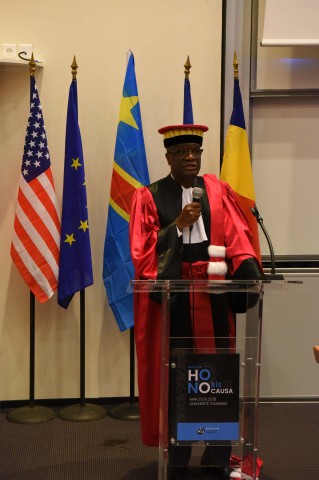The UA proud of its former student, Nobel Peace Prize winner!
 Denis Mukwege, a former student of the AU Faculty of Medicine, who graduated in Obstetrics and Gynaecology in 1989, has just been awarded the 2018 Nobel Peace Prize. The University of Angers is very happy about this news and would like to congratulate him!
Denis Mukwege, a former student of the AU Faculty of Medicine, who graduated in Obstetrics and Gynaecology in 1989, has just been awarded the 2018 Nobel Peace Prize. The University of Angers is very happy about this news and would like to congratulate him!
"I am delighted to receive this prestigious title, which recognizes the exemplary career of this humanist who has devoted his career to the cause of women", declared Christian Roblédo president of the UA who had awarded him the titles and insignia of doctor honoris causa last January, thus saluting his investment to condemn the use of rape and sexual violence as a war weapon.
Trained at the University of Angers
Born in 1955 near Bukavu (Democratic Republic of Congo, DRC), Denis Mukwege graduated from the University of Burundi with a doctorate in medicine. "At the time, my favourite field was paediatrics. My thesis focused on the vaccination of new-borns against hepatitis B," he explains.
Denis Mukwege is quickly faced with the high maternal mortality affecting women in his country. And decides to turn to obstetrics and gynaecology. In 1984, he was awarded a scholarship and arrived at the University of Angers to train in this speciality. "What struck me most was the cold of winter."
In Angers, Denis Mukwege finds warmth from the many friends he makes and founds with them the Association France-Kivu which has never stopped supporting him. After graduating as a gynaecologist from the Faculty of Medicine in 1989 and 5 years at the CHU d'Angers, proposals to settler are numerous, but his selflessness and civic-mindedness overcome his hesitations. He returns to the DRC in 1989 and takes care of the Lemera hospital, of which he becomes doctor and director. The facility was completely destroyed during the 1996 conflict.
After this tragedy, Denis Mukwege chaired the construction of Panzi hospital (450 beds), which he has been running since 1999. He then created a medical school and a midwifery school.
Rape as a war weapon
As of 1999, rape was used as a war weapon in the DRC. It involves women of all ages, but also children and infants. In Panzi, over an 18-year period, "we have cared for more than 51,900 women and 2,100 children under the age of 5". Dr Mukwege arranged the intake of victims (10 to 15 new cases per day), offering comprehensive care: surgical, then psychological and social, not to mention legal assistance.
Denis Mukwege uses his international reputation to denounce the abuses perpetrated by armed groups for the benefit of mining trafficking and became a target. In 2012, he miraculously escaped an assassination attempt. Having taken refuge in Belgium, then in the USA, he decides to return home, in response to the pressing demand of the women of Kivu, and now lives in seclusion within the hospital. "I am a witness to crimes committed against women and women's bodies. Faced with this, we cannot give up," he justifies. His safety is permanently ensured by the police forces.
His human rights work has received many awards: Legion of Honour, Olof Palme Prize, King Baudoin Prize, Sakharov Prize for Freedom of Thought in 2014... On 23 January 2018, the University of Angers awarded him the title and insignia of Doctor Honoris Causa.
A shared price
The committee also awarded the 2018 Nobel Prize to another ambassador for the cause of women, Nadia Murad, a young woman who spent 11 months in the hands of Daesh, Iraq, reduced to sexual slavery.
The UN has welcomed this dual appointment which "will help advance the fight against sexual violence as a weapon of war in conflicts".
